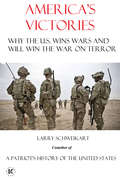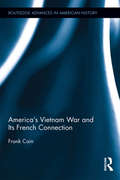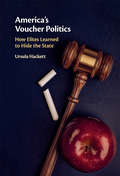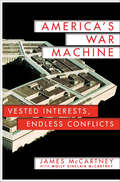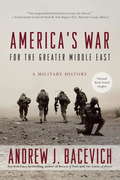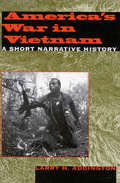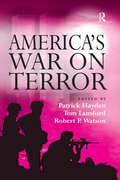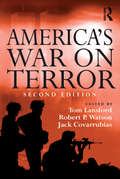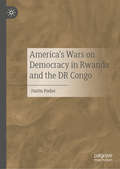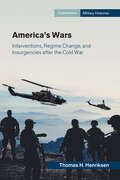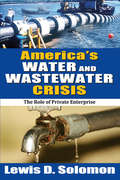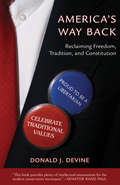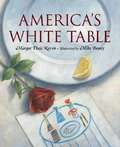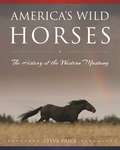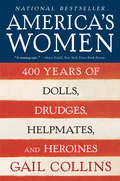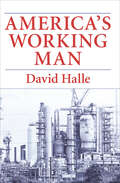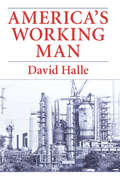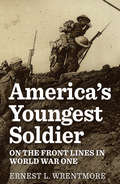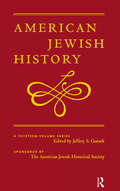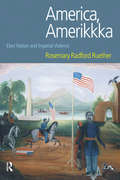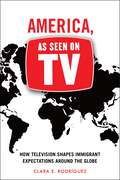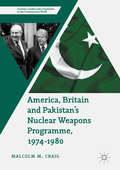- Table View
- List View
America's Victories: Why America Wins Wars and Why They Will Win the War on Terror
by Larry SchweikartIn America's Victories, Professor Larry Schweikart restores the truth about our amazing military heritage. Just as he did in his acclaimed previous book, A Patriot's History of the United States, Professor Schweikart cuts through the distortions passed along by academia and the media
America's Vietnam War and Its French Connection (Routledge Advances in American History #5)
by Frank CainThat America was drawn into the Vietnam War by the French has been recognized, but rarely explored. This book analyzes the years from 1945 with the French military reconquest of Vietnam until 1963 with the execution of the French-endorsed dictator, Ngo Dinh Diem, demonstrating how the US should not have followed the French into Vietnam. It shows how the Korean War triggered the flow of American military hardware and finances to underpin France’s war against the Marxist-oriented Vietnam Republic led by Ho Chi Minh.
America's Vital Interest In Global Health: Protecting Our People, Enhancing Our Economy, and Advancing Our International Interests
by Board on International HealthInformation on America's Vital Interest In Global Health
America's Voucher Politics: How Elites Learned to Hide the State
by Ursula HackettWhat explains the explosive growth of school vouchers in the last two decades? In America's Voucher Politics, Ursula Hackett shows that the voucher movement is rooted in America's foundational struggles over religion, race, and the role of government versus the private sector. Drawing upon original datasets, archival materials, and more than one hundred interviews, Hackett shows that policymakers and political advocates use strategic policy design and rhetoric to hide the role of the state when their policy goals become legally controversial. For over sixty years of voucher litigation, white supremacists, accommodationists, and individualists have deployed this strategy of attenuated governance in court. By learning from previous mistakes and anticipating downstream effects, policymakers can avoid painful defeats, gain a secure legal footing, and entrench their policy commitments despite the surging power of rivals. An ideal case study, education policy reflects multiple axes of conflict in American politics and demonstrates how policy learning unfolds over time.
America's War Machine: Vested Interests, Endless Conflicts
by James McCartney Molly Sinclair McCartneyA veteran Washington reporter reveals how years of military-slanted domestic and foreign policy have turned the U.S. into a perpetual war machine.When President Dwight D. Eisenhower prepared to leave the White House in 1961, he did so with an ominous message for the American people about the "disastrous rise" of the military-industrial complex. Fifty years later, the complex has morphed into a virtually unstoppable war machine, one that dictates U.S. economic and foreign policy in a direct and substantial way.Based on his experiences as an award-winning Washington-based reporter covering national security, James McCartney presents a compelling history, from the Cold War to present day that shows that the problem is far worse and far more wide-reaching than anything Eisenhower could have imagined. Big Military has become "too big to fail" and has grown to envelope the nation's political, cultural and intellectual institutions. These centers of power and influence, including the now-complicit White House and Congress, have a vested interest in preparing and waging unnecessary wars. The authors persuasively argue that not one foreign intervention in the past 50 years has made us or the world safer.With additions by Molly Sinclair McCartney, a fellow journalist with 30 years of experience, America's War Machine provides the context for today's national security state and explains what can be done about it.
America's War for the Greater Middle East: A Military History
by Andrew J. BacevichRetired army colonel and New York Times bestselling author Andrew J. Bacevich provides a searing reassessment of U.S. military policy in the Middle East over the past four decades. From the end of World War II until 1980, virtually no American soldiers were killed in action while serving in the Greater Middle East. Since 1990, virtually no American soldiers have been killed in action anywhere else. What caused this shift? Andrew J. Bacevich, one of the country's most respected voices on foreign affairs, offers an incisive critical history of this ongoing military enterprise--now more than thirty years old and with no end in sight. During the 1980s, Bacevich argues, a great transition occurred. As the Cold War wound down, the United States initiated a new conflict--a War for the Greater Middle East--that continues to the present day. The long twilight struggle with the Soviet Union had involved only occasional and sporadic fighting. But as this new war unfolded, hostilities became persistent. From the Balkans and East Africa to the Persian Gulf and Central Asia, U.S. forces embarked upon a seemingly endless series of campaigns across the Islamic world. Few achieved anything remotely like conclusive success. Instead, actions undertaken with expectations of promoting peace and stability produced just the opposite. As a consequence, phrases like "permanent war" and "open-ended war" have become part of everyday discourse. Connecting the dots in a way no other historian has done before, Bacevich weaves a compelling narrative out of episodes as varied as the Beirut bombing of 1983, the Mogadishu firefight of 1993, the invasion of Iraq in 2003, and the rise of ISIS in the present decade. Understanding what America's costly military exertions have wrought requires seeing these seemingly discrete events as parts of a single war. It also requires identifying the errors of judgment made by political leaders in both parties and by senior military officers who share responsibility for what has become a monumental march to folly. This Bacevich unflinchingly does. A twenty-year army veteran who served in Vietnam, Andrew J. Bacevich brings the full weight of his expertise to this vitally important subject. America's War for the Greater Middle East is a bracing after-action report from the front lines of history. It will fundamentally change the way we view America's engagement in the world's most volatile region. Praise for America's War for the Greater Middle East"Bacevich is thought-provoking, profane and fearless. . . . [His] call for Americans to rethink their nation's militarized approach to the Middle East is incisive, urgent and essential."--The New York Times Book Review "Bacevich's magnum opus . . . a deft and rhythmic polemic aimed at America's failures in the Middle East from the end of Jimmy Carter's presidency to the present."--Robert D. Kaplan, The Wall Street Journal "[A] monumental new work . . . One of the grim and eerie wonders of his book is the way in which just about every wrongheaded thing Washington did in that region in the fourteen-plus years since 9/11 had its surprising precursor in the two decades of American war there before the World Trade Center towers came down."--The Huffington Post "An unparalleled historical tour de force certain to affect the formation of future U.S. foreign policy."--Lieutenant General Paul K. Van Riper, U.S. Marine Corps (Ret.)From the Hardcover edition.
America's War in Vietnam: A Short Narrative History
by Larry H. Addington&“If you want to read one book about Vietnam, read this one.&” —New York Review of Books Drawing on years of experience teaching about the war, Larry H. Addington presents a short, narrative history of the origins, course, and outcome of America&’s military involvement in Vietnam. Not intended as a competitor to the many excellent comprehensive studies of the Vietnam Era, this book will prove a useful introduction and a concise reference to America&’s longest, most controversial war. Addington reviews the history of pre-colonial Vietnam, the impact of French imperialism and the Indochina War, and the Cold War origins of American involvement. He then details US policy after the 1954 Geneva Accords, its role in the establishment of South Vietnam, and the outbreak of a new war. Turning to America&’s deepening involvement, Addington examines the US strategies for waging air and ground war, the impact of the war at home, and the reasons for the failure of US policy under President Johnson. He studies the successes and failures of the policy of withdrawal under President Nixon and concludes with an overview of the war&’s aftermath and its legacy.
America's War on Same-Sex Couples and Their Families
by Daniel R. PinelloAmerica's War on Same-Sex Couples and Their Families is a legal, political, and social history of constitutional amendments in twenty American states (with 43 percent of the nation's population) that prohibited government recognition of all forms of relationship rights (marriage, civil unions, and domestic partnerships) for same-sex couples. Based on 175 interviews with gay and lesbian pairs in Georgia, Michigan, North Carolina, Ohio, Texas, and Wisconsin, the volume has great human-interest value and chronicles how same-sex couples and their children coped within harsh legal environments. The work ends with a lively explanation of how the federal judiciary rescued these families from their own governments. In addition, the book provides a model of the grassroots circumstances under which harassed minority groups migrate out of oppressive state regimes, together with an estimate of the economic and other costs (to the refugees and their governments) of the flight from persecution.
America's War on Terror
by Tom Lansford Patrick HaydenThis title was first published in 2003. 9/11 has become more than a date. It has become a noun, an idea shaped and moulded by the media and the American political establishment and the rationale for the subsequent "War on Terror". But what are the real factors that have motivated the world's sole remaining superpower to engage in a permanent war declared on an often elusive and abstract enemy and risk the very relationships that have augmented that global status? While the tragic events of the 11th of September 2001 caused a sea-change in the perception and realities of American security interests and its ability to project a foreign policy agenda, simplistic views that the resulting "War on Terror" is merely "reactionary warfaring" no longer carry any credibility. To fully understand the direction of contemporary US foreign policy requires a detailed understanding of the complex political, historical and personal processes which influence America's new sense of itself and its view of the world.
America's War on Terror: Second Edition
by Robert P. WatsonDeveloping ideas established in the successful first edition, this new version of America's War on Terror updates and expands the original collection of essays, allowing the reader to fully understand how the causes of the war on terror, both the domestic and foreign policy implications, and the future challenges faced by the United States have moved on since 2003. Features include: "
America's Wars on Democracy in Rwanda and the DR Congo
by Justin PodurThis book examines US interventions in the Democratic Republic of the Congo and Rwanda -- two countries whose post-independence histories are inseparable. It analyzes the US campaigns to prevent Patrice Lumumba from turning the DR Congo into a sovereign, democratic, prosperous republic on a continent where America’s ally apartheid South Africa was hegemonic; America’s installation of and support for Mobutu to keep the region under neo-colonial control; and America’s pre-emption of the Africa-wide movement for multiparty democracy in Rwanda and Zaire in the 1990s by supporting Paul Kagame’s Rwandan Patriotic Front (RPF). In addition, the book discusses the concepts of African development, democracy, genocide, foreign policy, and international politics.
America's Wars: Interventions, Regime Change, and Insurgencies after the Cold War (Cambridge Military Histories)
by Thomas H. HenriksenThe collapse of the Soviet Union ushered in American global hegemony in world affairs. In the post-Cold War period, both Democrat and Republican governments intervened, fought insurgencies, and changed regimes. In America's Wars, Thomas Henriksen explores how America tried to remake the world by militarily invading a host of nations beset with civil wars, ethnic cleansing, brutal dictators, and devastating humanitarian conditions. The immediate post-Cold War years saw the United States carrying out interventions in the name of Western-style democracy, humanitarianism, and liberal internationalism in Panama, Somalia, Haiti, Bosnia and Kosovo. Later, the 9/11 terrorist attacks led America into larger-scale military incursions to defend itself from further assaults by al Qaeda in Afghanistan and from perceived nuclear arms in Iraq, while fighting small-footprint conflicts in Africa, Asia, and Arabia. This era is coming to an end with the resurgence of great power rivalry and rising threats from China and Russia.
America's Water and Wastewater Crisis: The Role of Private Enterprise
by Lewis D. SolomonThis book examines the role of private firms in the American water and wastewater industry. As more water infrastructure shifts from public- to private-sector control, vendors, consultants, and facilities are taking on more importance. Lewis D. Solomon presents an historical overview of water supply and treatment needs and the role of the government, including how water policy has been crafted. He argues that water scarcity is becoming a problem due to groundwater depletion, contamination, and patterns of consumption. He examines the impact of climate change on water availability and quality considering voluntary conservation programs and mandatory restrictions for water use.Solomon points to how for-profit firms can use technology to increase water supply. He describes what privatization would look like in practice and reviews evidence from two case studies. Solomon proposes privatization as a viable response to America's water crisis that can address both scarcity and capital problems.America's Water and Wastewater Crisis presents a careful examination of how the water industry has operated in the United States in the past and how it may work as we move into the future. This book is invaluable to environmental specialists, businessmen, and government officials.
America's Way Back: Reclaiming Freedom, Tradition, and Constitution
by Donald Devine&“The solution for the modern GOP . . . Intellectual ammunition for the modern conservative movement.&” —SENATOR RAND PAULHow can America recover from economic stagnation, moral exhaustion, and looming bankruptcy? Donald J. Devine shows the way.Devine, a longtime adviser to Ronald Reagan, lays out a powerful case for the philosophical synthesis of freedom and tradition that Reagan said was the essence of modern conservatism. The secret of America&’s success, he shows, has been the Constitution&’s capacity to harmonize the twin ideals of freedom and tradition. But today, progressivism has so corrupted modern political thinking—in both parties—that leaders keep calling for the same failed tactics: more money poured into more big-government programs.In America&’s Way Back, Devine not only reveals where things went wrong, and why, but also points the way to reclaiming America&’s freedom, prosperity, and creativity. The solution lies in a new &“fusion&” of traditional and libertarian thought.
America's White Table
by Margot Theis RavenA little-known tradition to the outside civilian world, "the white table" originated during the time of the Vietnam War as a symbol for and remembrance to service members held prisoner of war or missing in action. Solitary and solemn, it is the table where no one will ever sit. As a special gift to her Uncle John, Katie and her sisters are asked to help set this white table for dinner one night. When Mama explains the significance of each item placed on the table, Katie comes to understand and appreciate the depth of sacrifice that her uncle, and each member of America's armed services, may be called to give. The white table has been set across America in mess halls and at military events for almost 3o years. In thoughtful, evocative prose, Margot Theis Raven, author of Mercedes and the Chocolate 'Pilot, brings to life this ceremony of remembrance. Artist Mike Benny's intimate, detailed artwork gives a sense of meaning and shared experience. "The willingness with which our young people are likely to serve in any war, no matter how justified, shall be directly proportional as to how they perceive the veterans of earlier wars were treated and appreciated by their nation." --General George Washington
America's Wild Horses: The History of the Western Mustang
by Steve PriceThere is no creature that quite embodies the beauty and grandeur of the American West as does the wild horse. For thousands of years, the horse has roamed the plains and valleys of the American continent, free of the encumbrances of man or the saddle. In America’s Wild Horses, award-winning photographer and lifelong horse lover Steven Price celebrates the timeless magnificence of the American mustang.Meticulously researched, Price offers a cultural history of the American wild horse that is unparalleled in its exquisite detail and poignant prose. Beginning with chapters on prehistoric equines, Price sweeps through all the most important historical epochs in the history of the American mustang. Detailed accounts of horse-breeding in the Southwest, Native American horsemanship, and mustangs in the golden age of the iconic American cowboys each detail the profound impact that the wild horse has had in shaping American culture. Later chapters chronicle the legacy of the horse in the twentieth and twenty-first centuries, specifically emphasizing the legal and scientific measures that are being taken by horse-lovers across the country to ensure that later generations will also be able to witness the majesty of the wild horse.Featuring dozens of stunning photographs by the author, and interspersed with firsthand interviews with some of the most renowned horse experts today, America’s Wild Horses is a required read for all equine lovers.
America's Women
by Gail CollinsAmerica's Women tells the story of more than four centuries of history. It features a stunning array of personalities, from the women peering worriedly over the side of the Mayflower to feminists having a grand old time protesting beauty pageants and bridal fairs. Courageous, silly, funny, and heartbreaking, these women shaped the nation and our vision of what it means to be female in America. <P><P>By culling the most fascinating characters -- the average as well as the celebrated -- Gail Collins, the editorial page editor at the New York Times, charts a journey that shows how women lived, what they cared about, and how they felt about marriage, sex, and work. She begins with the lost colony of Roanoke and the early southern "tobacco brides" who came looking for a husband and sometimes -- thanks to the stupendously high mortality rate -- wound up marrying their way through three or four. Spanning wars, the pioneering days, the fight for suffrage, the Depression, the era of Rosie the Riveter, the civil rights movement, and the feminist rebellion of the 1970s, America's Women describes the way women's lives were altered by dress fashions, medical advances, rules of hygiene, social theories about sex and courtship, and the ever-changing attitudes toward education, work, and politics. While keeping her eye on the big picture, Collins still notes that corsets and uncomfortable shoes mattered a lot, too. <P><P>"The history of American women is about the fight for freedom," Collins writes in her introduction, "but it's less a war against oppressive men than a struggle to straighten out the perpetually mixed message about women's roles that was accepted by almost everybody of both genders." <P><P>Told chronologically through the compelling stories of individual lives that, linked together, provide a complete picture of the American woman's experience, America's Women is both a great read and a landmark work of history.
America's Working Man: Work, Home, and Politics Among Blue Collar Property Owners
by David Halle&“An unusually deep and wide-ranging study&” by a sociologist who spent years listening to and living among workers at a New Jersey chemical plant (Journal of American Studies). Over a period of six years during the late 1970s, at factory and warehouse, at the tavern across the road, in their homes and union meetings, on fishing trips and social outings, David Halle talked and listened to workers of an automated chemical plant in New Jersey&’s industrial heartland—white, male, and mostly Catholic. He has emerged with an unusually comprehensive and convincingly realistic picture of blue-collar life in America during this era. Throughout the book, Halle illustrates his analysis with excerpts of workers&’ views on everything from strikes, class consciousness, politics, job security, and toxic chemicals to marriage, betting on horses, God, home-ownership, drinking, adultery, the Super Bowl, and life after death. Halle challenges the stereotypes of the blue-collar mentality and provides a detailed, in-depth portrait of one community of workers at a time when it was relatively affluent and secure. &“Absorbing reading.&”—Business Week
America's Working Man: Work, Home, and Politics among Blue-Collar Property Owners
by David HalleOver a period of six years, at factory and warehouse, at the tavern across the road, in their homes and union meetings, on fishing trips and social outings, David Halle talked and listened to workers of an automated chemical plant in New Jersey's industrial heartland. He has emerged with an unusually comprehensive and convincingly realistic picture of blue-collar life in America. Throughout the book, Halle illustrates his analysis with excerpts of workers' views on everything from strikes, class consciousness, politics, job security, and toxic chemicals to marriage, betting on horses, God, home-ownership, drinking, adultery, the Super Bowl, and life after death. Halle challenges the stereotypes of the blue-collar mentality and argues that to understand American class consciousness we must shift our focus from the "working class" to be the "working man. "
America's Youngest Soldier
by Ernest L. WrentmoreAmerica's Youngest Soldier, originally published in 1958 as In Spite of Hell, is the gripping account of Ernest L. Wrentmore, the youngest soldier in the American Expeditionary Force during World War One. Wrentmore served with honor despite his age (two months shy of his thirteenth birthday at the time of his enlistment in September 1917), and despite the horrors he witnessed in the trenches in France. Wrentmore saw front-line service on three battle fronts, and was cited for bravery for delivering a message, under fire, that made it possible for his unit to advance. Wrentmore was wounded twice and severely gassed; and on the night of October 17, 1918, he was evacuated from the field of battle during the first phase of the Meuse-Argonne offensive.
America, American Jews, and the Holocaust: American Jewish History (American Jewish History #4)
by Jeffrey S. GurockThis volume incorporates studies of the persecution of the Jews in Germany, the respective responses of the German-American Press and the American-Jewish Press during the emergence of Nazism, and the subsequent issues of rescue during the holocaust and policies towards the displaced.
America, Amerikkka: Elect Nation and Imperial Violence (Religion and Violence)
by Rosemary Radford RuetherAmerica views itself as a nation inhabiting a "promised land" and enjoying a favoured relation with God. This view of unique election has been coupled with racial exclusivism and the marginalization of non-white citizens.America, Amerikkka traces the historical and ideological patterns behind America’s sense of itself. In its examination of America’s "chosenness", the book ranges across the doctrine of the "rights of man" in the 18th and 19th centuries, the role of America in the twentieth century as "global policeman", and the enforcement of neo-colonial relations over the "third world". The volume argues for a vision of global relations between peoples based on justice and mutuality, rather than hegemonic dominance.
America, América: A New History of the New World
by Greg GrandinA New York Times bestseller&“An extraordinarily ambitious book . . . America, América reads at times as the historical equivalent of the great epic novels of Gabriel García Márquez.&” —Irish TimesFrom the Pulitzer Prize–winning historian, the first comprehensive history of the Western Hemisphere, a sweeping five-century narrative of North and South America that redefines our understanding of bothThe story of how the United States&’ identity was formed is almost invariably told by looking east to Europe. But as Greg Grandin vividly demonstrates, the nation&’s unique sense of itself was in fact forged facing south toward Latin America. In turn, Latin America developed its own identity in struggle with the looming colossus to the north. In this stunningly original reinterpretation of the New World, Grandin reveals how North and South emerged from a constant, turbulent engagement with each other.America, América traverses half a millennium, from the Spanish Conquest—the greatest mortality event in human history—through the eighteenth-century wars for independence, the Monroe Doctrine, the coups and revolutions of the twentieth century, and beyond. Grandin shows, among other things, how in response to U.S. interventions, Latin Americans remade the rules, leading directly to the founding of the United Nations; and how the Good Neighbor Policy allowed FDR to assume the moral authority to lead the fight against world fascism.Grandin&’s book sheds new light on well-known historical figures like Bartolomé de las Casas, Simón Bolívar, and Woodrow Wilson, as well as lesser-known actors such as the Venezuelan Francisco de Miranda, who almost lost his head in the French Revolution and conspired with Alexander Hamilton to free America from Spain; the Colombian Jorge Gaitán, whose unsolved murder inaugurated the rise of Cold War political terror, death squads, and disappearances; and the radical journalist Ernest Gruening, who, in championing non-interventionism in Latin America, helped broker the most spectacularly successful policy reversal in United States history. This is a monumental work of scholarship that will fundamentally change the way we think of Spanish and English colonialism, slavery and racism, and the rise of universal humanism. At once comprehensive and accessible, America, América shows that centuries of bloodshed and diplomacy not only helped shape the political identities of the United States and Latin America but also the laws, institutions, and ideals that govern the modern world. In so doing, Grandin argues that Latin America&’s deeply held culture of social democracy can be an effective counterweight to today&’s spreading rightwing authoritarianism.A culmination of a decades-long engagement with hemispheric history, drawing on a vast array of sources, and told with authority and flair, this is a genuinely new history of the New World.
America, As Seen on TV: How Television Shapes Immigrant Expectations around the Globe
by Clara E. RodríguezFinalist, 2020 Latino Book Awards, Best Academic Themed BookThe surprising effects of American TV on global viewers As a dominant cultural export, American television is often the first exposure to American ideals and the English language for many people throughout the world. Yet, American television is flawed, and, it represents race, class, and gender in ways that many find unfair and unrealistic. What happens, then, when people who grew up on American television decide to come to the United States? What do they expect to find, and what do they actually find? In America, As Seen on TV, Clara E. Rodríguez surveys international college students and foreign nationals working or living in the US to examine the impact of American television on their views of the US and on their expectations of life in the United States. She finds that many were surprised to learn that America is racially and economically diverse, and that it is not the easy-breezy, happy endings culture portrayed in the media, but a work culture. The author also surveys US-millennials about their consumption of US TV and finds that both groups share the sense that American TV does not accurately reflect racial/ethnic relations in the US as they have experienced them. However, the groups differ on how much they think US TV has influenced their views on sex, smoking and drinking. America, As Seen on TV explores the surprising effects of TV on global viewers and the realities they and US millennials actually experience in the US.
America, Britain and Pakistan’s Nuclear Weapons Programme, 1974-1980: A Dream of Nightmare Proportions (Security, Conflict and Cooperation in the Contemporary World)
by Malcolm M. CraigThis book analyses US and UK efforts to shut down Pakistan's nuclear programme in the 1970s, between the catalytic Indian nuclear test of May 1974 and the decline of sustained non-proliferation activity from mid-1979 onwards. It is a tale of cooperation between Washington and London, but also a story of divisions and disputes. The brutal economic realities of the decade, globalisation, and wider geopolitical challenges all complicated this relationship. Policy and action were also affected by changes elsewhere in the world. Iran's 1979 revolution brought a new form of political Islamic radicalism to prominence. The fears engendered by the Ayatollah and his followers, coupled to the blustering rhetoric of Pakistani leaders, gave rise to the 'Islamic bomb', a nuclear weapon supposedly created by Pakistan to be shared amongst the Muslim ummah. This study thus combines cultural, diplomatic, economic, and political history to offer a rigorous, deeply researched account of a critical moment in nuclear history.
